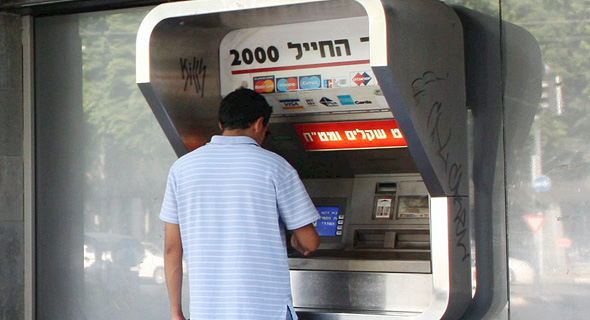Nearly 25% of Israeli Households Live in Perpetual Overdraft, Says Report
A Monday report by Israel's Central Bureau of Statistics is just the latest in a series of findings that showcase how Israelis are floundering under the country's high cost of living
Of the 97.5% Israeli households that have a bank account, 42% have been in overdraft for at least one month during the past year—1.1 million households accounting for about 4 million people, according to a new report published Monday by Israel's Central Bureau of Statistics (CBS). Twenty-two percent were in overdraft 10 months or more of the year. Of the households that have at least one child, 52% were in overdraft for at least one month of the year, compared to 30% of childless households.
This is the sixth year in a row of a longitude CBS survey of ownership of financial assets by households. The current survey was conducted between June 2018 and February 2019. The same households are contacted every year.

Of the households in overdraft, 26%—295,000 households accounting for 1.1 million people—were contacted by the bank at least once over the issue, while 7% were contacted at least six times. Of those in overdraft, 5% or approximately 60,000 households had their bank accounts blocked at least once during the past year.
While only 2.5% of households surveyed by the bureau did not have a bank account, there was a large discrepancy between Jewish respondents and respondents from Israel's Arab minority, which amounts to approximately 20% of the country's population. While less than 1% of Jewish households reported they did not have a bank account, for Arab households that number rose to 13%. In the bottom two deciles of gross income per capita, 2% of Jewish households did not have a bank account compared to 20% of Arab households. There was a positive correlation between income and level of education and the ownership of a bank account for both groups.
Eleven percent of Jewish households reported no family member had a credit card, compared to 51% of Arab households. Overall, 16% of surveyed households, or 425,000 households accounting for 1.3 million people, reported no credit card ownership.
Over a quarter of households, 27%, reported having a mortgage, with the average repayment remaining being NIS 500,700 (approximately $144,000). Thirty-one percent of Jewish households reported a mortgage compared to 4% of Arab ones. The likelihood of having a mortgage rises with income, except for the top two deciles of gross income per capita, where the trend reverses. The likelihood also rises with education and the number of household members.
Twenty-nine percent of households, or 789,800 households accounting for 2.9 million people, reported taking out loans other than a mortgage, with the average repayment remaining being NIS 96,200 (approximately $27,600). Almost 2 million households, or 71%, reported having at least one long-term saving scheme, and 56%, or 1.55 million households, reported at least one short or mid-term saving scheme. Sixty-six percent, or 1.78 million households, reported at least one member had a pension fund. There was a positive correlation between income and the existence of any type of saving schemes.
Several reports surveying Israel's economic situation on the household and personal level were published recently, and none were very favorable. A second CBS report published Monday found the gender wage gap in the country keeps increasing, while a November report from the bureau found income polarization is also on the rise. An "alternative" poverty report published Monday by Latet, Israel’s largest nonprofit organization, defined a quarter of Israelis as poor, and found 18.5% suffered from nutrition insecurity while 6.5% suffered from food insecurity. A November report by Bituah Leumi, Israel's national social security agency, found a third of Israeli employees made less than the minimum monthly wage in 2017. A recent survey by credit rating app Captain Credit, which is operated by the Dun & Bradstreet Corp. and relies on the credit card database of the Bank of Israel, found Israelis have on average a negative checking account balance of NIS 25,000 (approximately $7,090), and 5% of Israelis are paying off at least five loans concurrently.



